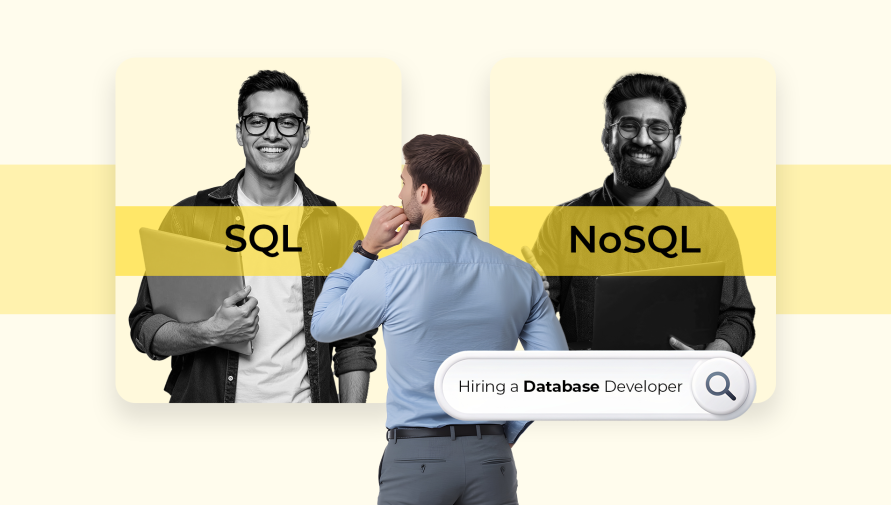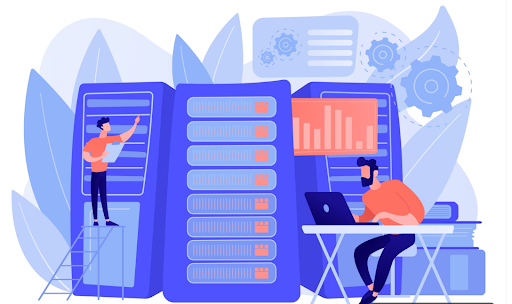SQL vs. NoSQL: What to Look for When Hiring a Database Developer
- Sathvik Poojary
- May 16, 2025
- 5 Minute Read

Modern applications rely on efficient, secure, and scalable database systems to power everything from analytics to real-time transactions.
As data complexity grows, hiring a database developer with the right technical and architectural judgment becomes essential. In fact, a study shows that the growth rate of hiring database developers and architects is projected to be 9% from 2023 to 2033. The developer’s understanding of structured and unstructured databases directly influences performance, flexibility, and scalability.
Whether the project demands rigid schemas or dynamic data models, knowing when to use SQL or NoSQL technologies is key. This guide explores core differences and hiring criteria to help you choose the right database expert for your business.
Understanding the Fundamentals
Before hiring a database developer, it’s essential to understand what exactly SQL and NoSQL are. Each serves distinct use cases and requires specific skill sets.
What is SQL?
Structured Query Language (SQL) is used to manage and manipulate relational databases. It dates back to the 1970s and remains the industry standard for handling structured data. SQL enforces predefined schemas, making it ideal for applications requiring strict data consistency.
SQL systems are heavily used in industries such as banking, healthcare, and enterprise software. Examples of relational databases used frequently include MySQL, PostgreSQL, Microsoft SQL Server, and Oracle. These are popular platforms for transactional systems, reporting dashboards, and ERP software. You can hire top SQL developers from the 3M+ talent network in just 48 hours.
What is NoSQL?
NoSQL databases emerged to handle unstructured or semi-structured data on a large scale. Unlike SQL, they do not rely on fixed schemas. Types include document stores, key-value pairs, column-family stores, and graph databases.
Popular NoSQL systems include MongoDB, Cassandra, Redis, and Couchbase. These are preferred in e-commerce, social networks, IoT, and real-time analytics, where data structures evolve rapidly and horizontal scaling is essential. Businesses looking to harness the full potential of these technologies often choose to hire NoSQL developer experts who can efficiently design, implement, and scale such systems.
Key Differences Between SQL and NoSQL
Understanding the distinction between SQL and NoSQL databases is essential when hiring a database developer. The table below breaks down the core differences based on structure, scalability, flexibility, and more.
SQL Database |
NoSQL Database |
|
|
Data Structure |
Table-based with rows and columns | Document, Key-Value, Column-Family, or Graph-based |
| Schema Design | Requires predefined schemas |
Schema-less allows dynamic data structures |
|
Scalability |
Vertically scalable (add more power to one server) | Horizontally scalable (distribute across many nodes) |
| Flexibility & Performance | Optimized for structured data and complex queries |
Better performance for unstructured or semi-structured data |
|
Consistency Model |
Strong consistency via ACID compliance | Eventual consistency with the BASE model |
| Query Language | SQL (Structured Query Language) |
Varies; often proprietary or JSON-like syntax |
When to Use SQL vs. NoSQL in Projects
Choosing the right database depends on your project’s goals, scale, and data structure. SQL databases are best suited for applications that require structured data, complex queries, and transactional consistency, such as ERP systems, banking software, or CRM platforms.
NoSQL is ideal for projects with unstructured or rapidly changing data, such as social apps, real-time analytics tools, or content management systems. Its flexible schema supports rapid development and scale.
Some modern architectures use both SQL and NoSQL. This hybrid approach, known as polyglot persistence, allows businesses to optimize performance across various data needs and workloads.
Hiring a Database Developer: What to Look For

Hiring a database developer requires evaluating both technical depth and adaptability to your business context. Developers should not only be fluent in SQL or NoSQL but also bring relevant domain experience and collaboration capabilities.
1. Technical Skills Assessment
- A core knowledge of SQL developer skills or NoSQL developer skills is required.
- Familiarity with tools like PostgreSQL, MySQL, MongoDB, or Cassandra adds immediate value.
- A strong understanding of normalization, schema design, and relational or document-based models ensures structural efficiency.
2. Experience & Use Case Alignment
- Look for developers who have delivered projects aligned with your industry.
- Real-world experience with database implementations is more valuable than theoretical knowledge.
3. Problem-Solving & Optimization Skills
- The ability to write optimized queries is essential for performance.
- Indexing strategies, data partitioning, and modeling approaches are key indicators of technical maturity.
4. DevOps and Cloud Integration Knowledge
- Experience with cloud databases, such as AWS RDS or Azure Cosmos DB, is highly valuable.
- Familiarity with CI/CD pipelines reflects deployment readiness.
5. Soft Skills & Collaboration
- Strong communication helps align with the product, frontend, and analytics teams.
- Clear documentation and agile experience ensure seamless workflow across the lifecycle.
Database Developer Interview Questions

A structured interview reveals practical database developer skills, mindset, and adaptability. Below are key questions, and what a good answer should reflect:
- What’s your experience with both relational and non-relational database systems?
Look for candidates who mention specific platforms, such as PostgreSQL and MongoDB, and discuss the trade-offs clearly. - Can you walk us through a project where you selected SQL or NoSQL based on business needs?
They should explain the business context, data model requirements, and why the chosen system is a good match for the use case. - How do you typically handle scaling challenges and performance bottlenecks in production systems?
Strong answers include indexing strategies, query optimization, and decisions about horizontal or vertical scaling. - Describe your process for designing a scalable and efficient database schema.
Expect a mention of normalization, future-proofing for growth, and practical experience with schema evolution. - What steps do you take to ensure data consistency, integrity, and reliability?
They should talk about transactions, foreign key constraints, backup plans, and monitoring tools. - What monitoring and diagnostic tools do you use to maintain database health?
Good candidates cite tools like pgAdmin, MySQL Workbench, Prometheus, or cloud-native monitoring solutions. - How do you ensure compliance with data security regulations, such as GDPR or HIPAA?
They should mention encryption, access control, anonymization, and audit trails as part of their practices. - What’s your workflow for managing schema versioning and data migrations?
Expect mention of tools like Flyway, Liquibase, or manual scripts, with rollback and testing mechanisms. - Share an example of how you optimized a complex query and the outcome it produced.
Look for concrete before/after metrics, such as reduced execution time or load improvements. - How do you keep your database expertise up to date with ongoing industry trends?
They may reference blogs, GitHub projects, certifications, or participation in database communities.
Challenges and Trends in Database Development
As businesses evolve into data-first operations, the role of database developers is transforming to meet new technological and regulatory demands.
1. Evolving Developer Roles
Modern database developers are no longer siloed. They’re expected to contribute across full-stack environments and collaborate closely with DevOps, often handling CI/CD pipelines and infrastructure configuration.
2. Cloud-Native and Serverless Databases
The shift toward managed services like AWS Aurora and serverless platforms such as Firebase means developers must adapt to provisioning-less models, automated scaling, and event-driven architectures.
3. Security and Compliance Demands
Regulatory frameworks like GDPR, HIPAA, and SOC 2 have raised the bar for data handling. Developers must embed security measures, audit trails, and encryption policies directly into database logic and workflows.
4. Multi-Model and NewSQL Databases
Tools like ArangoDB, Fauna, and CockroachDB combine SQL reliability with the flexibility of NoSQL. Developers must now understand when and how to leverage these hybrid systems to meet complex data requirements.
Conclusion
Hiring a database developer is not just about filling a technical role. It’s about aligning expertise with business goals, technical architecture, and long-term scalability. Whether your needs involve complex relational data or flexible NoSQL structures, the choice must reflect your application’s performance, data consistency, and future growth.
When you hire database developers, strategic recruitment brings a balance of SQL or NoSQL skills, optimization expertise, and adaptability to evolving database technologies. Choosing the right one ensures faster delivery, fewer bottlenecks, and a strong foundation for your data-driven success.






